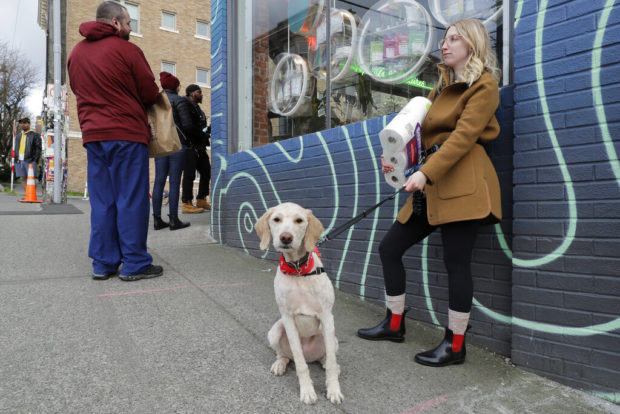
In this photo taken March 24, 2020, Mia Grace, right, holds a package of toilet paper as she and her dog Breezy observe social distancing chalk marks on the sidewalk while waiting to get in to The Reef Capitol Hill, a marijuana store in Seattle, which was limiting the number of people in the store at one time to help slow the spread of the new coronavirus. Earlier in the week, Washington Gov. Jay Inslee ordered nonessential businesses to close and the state’s more than 7 million residents to stay home in order to slow the spread of the new coronavirus. In Washington and several other states where marijuana is legal, pot shops and workers in the market’s supply chain were deemed essential and allowed to remain open. (AP Photo/Ted S. Warren)
Attempting to slow the spread of the coronavirus pandemic, authorities in many places are determining what shops and services can remain open.
This has left many contemplating an existential question: What, really, is essential?
And what are the things we really can’t do without, even though we might not need them for survival?
There’s general agreement in Asia, Europe, Africa and the United States: Health care workers, law enforcement, utility workers, food production and communications are generally exempt from lockdowns.
But some lists of exempted activities reflect a national identity—or the efforts of lobbyists.
Liquor stores
In many places, booze is on the list of essentials. Britain at first kept liquor stores off its list of shops allowed to remain open, but quickly added them following reports of supermarkets running out of alcoholic beverages.
“Recent events clearly demonstrate that the process of designating ‘essential services’ is as much about culture as any legal-political reality about what is necessary to keep society functioning,” said Christopher McKnight Nichols, associate professor of history at Oregon State University.
Like Britain, some US states allowed liquor stores to remain open, including New Mexico, which routinely ranks first in alcohol-related deaths per capita.
Marijuana, firearms
In some US states, golf, guns and ganja have been ruled essential, raising eyebrows and—in the case of guns—a good deal of ire.
Several states where marijuana is legal, such as California and Washington, deemed pot shops and workers in the market’s supply chain essential.
Connecticut Gov. Ned Lamont added gun shops to his list of essential businesses, generating shock and dismay among families of gun violence victims.
Lobbyists, too, have been trying to influence what gets on lists of essential services, so their clients’ businesses can remain open.
Businesses shut down
In Europe, Italy has the most stringent rules, with only essential businesses such as food shops and pharmacies remaining open.
In France, shops specializing in pastry, wine and cheese have been declared essential businesses.
“In times of uncertainty, institutions and practices that are central to the cultural identities can become really important touchstones—material markers of certainty, comfort, and mechanisms to persist,” said Aimee Huff, marketing professor at Oregon State University.

